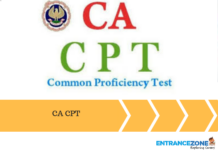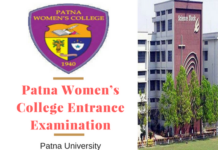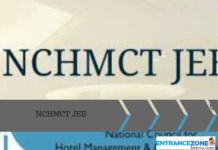B.Pharma is a 4-year undergraduate degree in pharmacy. Admission to B.Pharma courses in India is done through a combination of merit and entrance exams. Admissions to B Pharmacy programs in top colleges are typically determined through entrance exams, although some colleges may also consider merit-based admissions for the year 2023. To secure admission to the B Pharmacy course, candidates are required to qualify for a national, state, or university-level entrance exam. Prominent B Pharmacy colleges prioritize admission solely based on performance in the entrance exam. The most popular entrance exams for B.Pharma are:
Admission Open 2023
- Top University & Colleges Official Links, Application & Scholarship Forms.
Top B.Pharma Entrance Exams 2023
Contains
Here is a list of B.Pharma entrance exams for 2023:
- All India:
- GPAT (Graduate Pharmacy Aptitude Test)
- NIPER JEE (National Institute of Pharmaceutical Education and Research Joint Entrance Examination)
- NPAT (National Pharmacy Aptitude Test)
- State-level:
- WBJEE (West Bengal Joint Entrance Examination)
- GUJCET (Gujarat Common Entrance Test)
- BITSAT (Birla Institute of Technology and Science Admission Test)
- MHT-CET (Maharashtra Common Entrance Test)
- AP EAMCET (Andhra Pradesh Engineering Agriculture and Medical Common Entrance Test)
- TS EAMCET (Telangana State Engineering Agriculture and Medical Common Entrance Test)
- KCET (Karnataka Common Entrance Test)
- OJEE (Odisha Joint Entrance Examination)
- KEAM (Kerala Engineering Architecture Medical)
Pharmacy Exam Eligibility, Application Process Etc
- The eligibility criteria for these exams vary, but generally, candidates must have completed their 12th standard with science subjects from a recognized board. Some exams may also require candidates to have taken the NEET (National Eligibility cum Entrance Test) for medical and dental courses.
- The application process for these exams also varies, but it is typically done online. Candidates can find more information about the application process on the websites of the respective exam conducting bodies.
- The difficulty level of these exams also varies, but they are generally considered to be challenging. Candidates should prepare well for these exams by studying the relevant material and practicing with mock tests.
- The results of these exams are usually released a few months after the exams are conducted. Candidates who clear the exams are eligible for admission to B.Pharma courses at various colleges and universities across India.
B.Pharma Entrance Examination Details
Following are the National, State and University level entrance exam for pharmacy admission
Subscribe to Get Updated Information about Top B.Pharma Entrance Exams 2023 : B Pharmacy Admission - Admissions
| Exam | Level | Conducting Body | Eligibility |
|---|---|---|---|
| GPAT | All India | National Testing Agency (NTA) | Indian nationals who have completed their bachelor’s degree in pharmacy with a minimum of 50% aggregate marks. |
| NIPER JEE | All India | National Institute of Pharmaceutical Education and Research (NIPER) | Indian nationals who have completed their bachelor’s degree in pharmacy with a minimum of 50% aggregate marks. |
| NPAT | All India | All India Council for Technical Education (AICTE) | Indian nationals who have completed their bachelor’s degree in pharmacy with a minimum of 50% aggregate marks. |
| WBJEE | State-level | West Bengal Joint Entrance Examination Board (WBJEEB) | Indian nationals who have completed their 10+2 or equivalent examination with Physics, Chemistry and Biology/Mathematics with a minimum of 50% aggregate marks from a recognized board. |
| GUJCET | State-level | Gujarat Secondary and Higher Secondary Education Board (GSEB) | Indian nationals who have completed their 10+2 or equivalent examination with Physics, Chemistry and Biology/Mathematics with a minimum of 50% aggregate marks from a recognized board. |
| BITSAT | All India | Birla Institute of Technology and Science Pilani (BITS Pilani) | Indian nationals who have completed their 10+2 or equivalent examination with Physics, Chemistry and Biology/Mathematics with a minimum of 50% aggregate marks from a recognized board. |
| MHT-CET | State-level | Maharashtra State Council of Examination (MSCE) | Indian nationals who have completed their 10+2 or equivalent examination with Physics, Chemistry and Biology/Mathematics with a minimum of 50% aggregate marks from a recognized board. |
| AP EAMCET | State-level | Jawaharlal Nehru Technological University, Hyderabad (JNTUH) | Indian nationals who have completed their 10+2 or equivalent examination with Physics, Chemistry and Biology/Mathematics with a minimum of 50% aggregate marks from a recognized board. |
| TS EAMCET | State-level | Jawaharlal Nehru Technological University, Hyderabad (JNTUH) | Indian nationals who have completed their 10+2 or equivalent examination with Physics, Chemistry and Biology/Mathematics with a minimum of 50% aggregate marks from a recognized board. |
| KCET | State-level | Karnataka Examination Authority (KEA) | Indian nationals who have completed their 10+2 or equivalent examination with Physics, Chemistry and Biology/Mathematics with a minimum of 50% aggregate marks from a recognized board. |
| OJE | State-level | Odisha Joint Entrance Examination Board (OJEEB) | Indian nationals who have completed their 10+2 or equivalent examination with Physics, Chemistry and Biology/Mathematics with a minimum of 50% aggregate marks from a recognized board. |
| KEAM | State-level | Commissioner for Entrance Examinations (CEE) | Indian nationals who have completed their 10+2 or equivalent examination with Physics, Chemistry and Biology/Mathematics with a minimum of 50% aggregate marks from a recognized board. |
Most Popular Pharmacy Courses
There are many different pharmacy courses available, both undergraduate and postgraduate. Some of the most popular pharmacy courses include:
| Course Name | Duration | Eligibility | Career Prospects |
|---|---|---|---|
| Bachelor of Pharmacy (B.Pharm) | 4 years | 10+2 with Physics, Chemistry, and Biology | Pharmacist, Pharmacy Technician, Pharmaceutical Scientist |
| Master of Pharmacy (M.Pharm) | 2 years | B.Pharm | Clinical Pharmacist, Pharmaceutical Researcher, Pharmaceutical Marketing Manager |
| Doctor of Pharmacy (Pharm.D.) | 6 years | 10+2 with Physics, Chemistry, and Biology | Pharmacist, Clinical Pharmacist, Pharmaceutical Researcher, Pharmaceutical Marketing Manager |
| Diploma in Pharmacy (Dip. Pharm.) | 2 years | 10+2 with Physics, Chemistry, and Biology | Pharmacy Technician |
| Postgraduate Diploma in Pharmacy (PGDip. Pharm.) | 1 year | B.Pharm or M.Pharm | Clinical Pharmacist, Pharmaceutical Researcher, Pharmaceutical Marketing Manager |
| Certificate in Pharmacy (Cert. Pharm.) | 1 year | 10+2 with Physics, Chemistry, and Biology | Pharmacy Technician |
Most Popular Pharmacy Colleges
The most popular pharmacy colleges in India are:
- Jamia Hamdard University, New Delhi
- Panjab University, Chandigarh
- Birla Institute of Technology and Science–Pilani (BITS–Pilani)
- Dr. Bhanuben Nanavati College of Pharmacy, Mumbai
- Manipal College of Pharmaceutical Sciences
- Chandigarh University
- Delhi Institute of Pharmaceutical Sciences and Research
- The Maharaja Sayajirao University of Baroda
- JSS College Of Pharmacy Ooty
- Sri Ramachandra Institute of Higher Education and Research
These colleges are popular for a number of reasons, including their high academic standards, their strong faculty, and their excellent facilities. They also have a good reputation for placement, with many graduates going on to work in top pharmaceutical companies.
What is Pharmacy?
Pharmacy is the field of healthcare focused on medication preparation, dispensing, and management. Pharmacists ensure safe and effective use of drugs, collaborating with healthcare providers and patients. They provide medication counseling, monitor for side effects, and contribute to research and policy. Plays a crucial role in optimizing patient care through medication expertise.
Pharmacists As Career
Pharmacists are healthcare professionals responsible for the safe and effective use of medications. They dispense medications, counsel patients on proper usage, and monitor therapy for optimal care. They contribute to research, development, and industry regulation.
Generally Pharmacists work in various settings like community pharmacies, hospitals, and research. They need a bachelor’s degree in pharmacy (B.Pharm.) or a doctor of pharmacy (Pharm.D.) degree. B.Pharm. programs take about four years, while Pharm.D. programs take about six years.
FAQs
- What are the common entrance exams for admission to B Pharmacy programs in India?
- The common entrance exams for B Pharmacy admission in India include the All India Pharmacy Entrance Test (AIPEE), Graduate Pharmacy Aptitude Test (GPAT), and state-specific exams conducted by different universities or boards.
- Are there any alternative admission criteria for B Pharmacy besides entrance exams?
- Yes, some colleges may offer B Pharmacy admission based on merit, considering factors such as academic performance in qualifying exams or relevant work experience. However, entrance exams are generally the primary mode of admission for top B Pharmacy colleges in India.
- What career opportunities are available for pharmacists?
- Pharmacists have diverse career opportunities. They can work in community pharmacies, hospitals, clinics, pharmaceutical industries, research institutions, or government agencies. Pharmacists can also pursue careers in academia, research and development, regulatory affairs, pharmacovigilance, pharmaceutical marketing, or entrepreneurship. Additionally, they may specialize in areas such as clinical pharmacy, hospital pharmacy, industrial pharmacy, or pharmacoeconomics.


















Haaaaaasaßsßsss